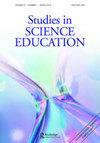国际科学教育文献中“培养”概念的使用,其潜力及其对教与学的影响
IF 9.9
2区 教育学
Q1 EDUCATION & EDUCATIONAL RESEARCH
引用次数: 76
摘要
培养是18世纪中期在德国兴起的一个复杂的教育概念。特别是在德国和斯堪的纳维亚半岛,教育概念成为指导正规和非正规教育的一般哲学框架。建设涉及教育的整个范围,从设定一般的教育目标到在不同学校学科中的具体运作,其中包括科学教育。近年来,国际科学和环境教育文献中逐渐开始使用“培养”这一概念。本文系统分析了国际上有关“培养”概念使用的文献,探讨了“培养”在科学教育中的意义和对科学教育的意义。至少有五个版本基于或密切相关的传统教育可以确定:(a)冯·洪堡的古典教育,(b)英美自由教育,(c)斯堪的纳维亚民间教育,(d)民主教育,和(e)批判解释学的教育。这些对培养的不同理解与它们的历史根源、教育理论、批判以及它们与科学教育哲学的关系(例如对科学素养的不同看法)有关。本文在批判解释学的基础上,从理论上发展了作为教育元理论的批判反思性培养观。它与变革性学习、可持续性教育和科学素养愿景三的理念有关。最后,讨论了批判性反思性培养对教与学的启示。本文章由计算机程序翻译,如有差异,请以英文原文为准。
Use of the concept of Bildung in the international science education literature, its potential, and implications for teaching and learning
Abstract Bildung is a complex educational concept that emerged in Germany in the mid eighteenth century. Especially in Germany and Scandinavia conceptions of Bildung became the general philosophical framework to guide both formal and informal education. Bildung concerns the whole range of education from setting educational objectives in general towards its particular operation in different school subjects, among them science education. In more recent years, the concept of Bildung has slowly begun to be used in the international science and environmental education literature. This paper presents a systematic analysis of the international literature concerning the use of the concept of Bildung, with a view on its meaning in and for science education. At least five versions based on or closely connected to the tradition of Bildung can be identified: (a) Von Humboldt’s classical Bildung, (b) Anglo-American liberal education, (c) Scandinavian folk-Bildung, (d) democratic education, and (e) critical-hermeneutic Bildung. These different understandings of Bildung are discussed in relation to their historical roots, educational theory, critique, and their relation to philosophies of science education, such as different visions of scientific literacy. Based on critical-hermeneutic Bildung, the paper theoretically develops views of critical-reflexive Bildung as an educational metatheory. It is connected to ideas of transformative learning, sustainability education and a Vision III of scientific literacy. Finally, some implications of critical-reflexive Bildung for teaching and learning are discussed.
求助全文
通过发布文献求助,成功后即可免费获取论文全文。
去求助
来源期刊

Studies in Science Education
EDUCATION, SCIENTIFIC DISCIPLINES-
CiteScore
15.30
自引率
2.00%
发文量
7
审稿时长
>12 weeks
期刊介绍:
The central aim of Studies in Science Education is to publish review articles of the highest quality which provide analytical syntheses of research into key topics and issues in science education. In addressing this aim, the Editor and Editorial Advisory Board, are guided by a commitment to:
maintaining and developing the highest standards of scholarship associated with the journal;
publishing articles from as wide a range of authors as possible, in relation both to professional background and country of origin;
publishing articles which serve both to consolidate and reflect upon existing fields of study and to promote new areas for research activity.
Studies in Science Education will be of interest to all those involved in science education including: science education researchers, doctoral and masters students; science teachers at elementary, high school and university levels; science education policy makers; science education curriculum developers and text book writers.
Articles featured in Studies in Science Education have been made available either following invitation from the Editor or through potential contributors offering pieces. Given the substantial nature of the review articles, the Editor is willing to give informal feedback on the suitability of proposals though all contributions, whether invited or not, are subject to full peer review. A limited number of books of special interest and concern to those involved in science education are normally reviewed in each volume.
 求助内容:
求助内容: 应助结果提醒方式:
应助结果提醒方式:


